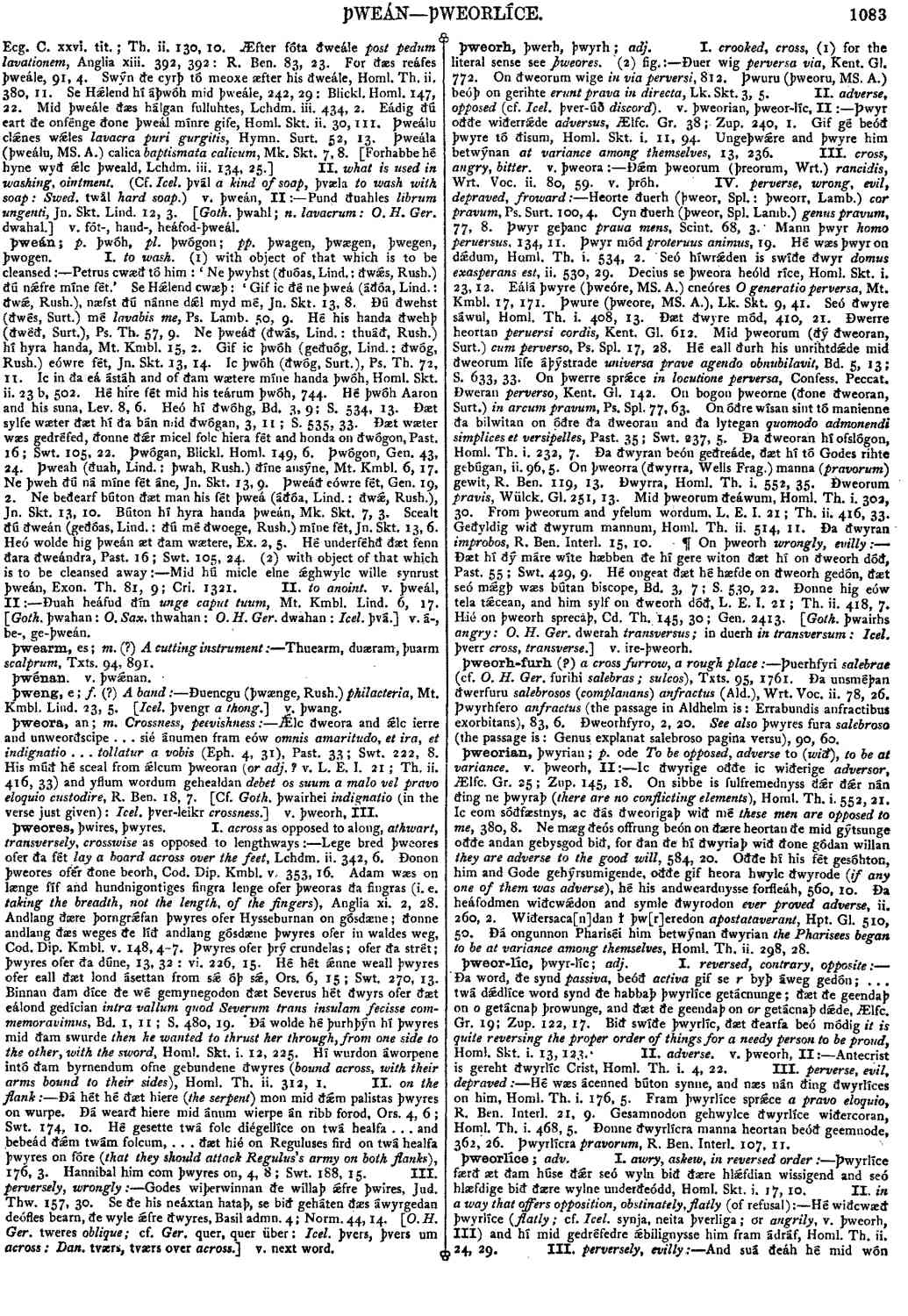þweorh
- adjective
-
Ðuer wig
perversa via,
- Kent. Gl. 772.
-
On ðweorum wige
in via perversi,
- 812.
-
Þwuru (þweoru, MS. A.) beóþ on gerihte
erunt prava in directa,
- Lk. Skt. 3, 5.
-
Þwyr oððe wiðerrǽde
adversus,
- Ælfc. Gr. 38 ;
- Zup. 240, 1.
-
Gif gé beóð þwyre tó ðisum,
- Homl. Skt. i. 11, 94.
-
Ungeþwǽre and þwyre him betwýnan
at variance among themselves,
- 13, 236.
-
Ðǽm þweorum (þreorum, Wrt.)
rancidis,
- Wrt. Voc. ii. 80, 59.
-
Heorte ðuerh (þweor, Spl.: þweorr, Lamb.)
cor pravum,
- Ps. Surt. 100, 4.
-
Cyn ðuerh (þweor, Spl. Lamb.)
genus pravum,
- 77, 8.
-
Þwyr geþanc
praua mens,
- Scint. 68, 3.
-
Mann þwyr
homo peruersus,
- 134, 11.
-
Þwyr mód
proteruus animus,
- 19.
-
Hé wæs þwyr on dǽdum,
- Homl. Th. i. 534, 2.
-
Seó híwrǽden is swíðe ðwyr
domus exasperans est,
- ii. 530, 29.
-
Decius se þweora heóld ríce,
- Homl. Skt. i. 23, 12.
-
Eálá þwyre (þweóre, MS. A.) cneóres
O generatio perversa,
- Mt. Kmbl. 17, 172.
-
Þwure (þweore,
- MS. A.),
- Lk. Skt. 9, 41.
-
Seó ðwyre sáwul,
- Homl. Th. i. 408, 13.
-
Ðæt ðwyre mód,
- 410, 21.
-
Ðwerre heortan
peruersi cordis,
- Kent. Gl. 612.
-
Mid þweorum (ðý ðweoran, Surt.)
cum perverso,
- Ps. Spl. 27, 28.
-
Hé eall ðurh his unrihtdǽde mid ðweorum lífe áþýstrade
universa prave agenda obnubilavit,
- Bd. 5, 13 ;
- S. 633, 33.
-
On þwerre sprǽce
in locutione perversa, Confess. Peccat.
-
Ðweran
perverso,
- Kent. Gl. 242.
-
On bogon þweorne (ðone ðweoran, Surt.)
in arcum pravum,
- Ps. Spl. 77, 63.
-
On óðre wísan sint tó manienne ða bilwitan on óðre ða ðweoran and ða lytegan
quomodo admonendi simplices et versipelles,
- Past. 35 ;
- Swt. 237, 5.
-
Ða ðweoran hí ofslógon,
- Homl. Th. i. 232, 7.
-
Ða ðwyran beón geðreáde, ðæt hí tó Godes rihte gebúgan,
- ii. 96, 5.
-
On þweorra (ðwyrra, Wells Frag.) manna ( pravorum ) gewit,
- R. Ben. 119, 23.
-
Ðwyrra,
- Homl. Th. i. 552, 35.
-
Ðweorum
pravis,
- Wülck. Gl. 251, 23.
-
Mid þweorum ðeáwum,
- Homl. Th. i. 302, 30.
-
From þweorum and yfelum wordum,
- L. E. I. 21 ;
- Th. ii. 416, 33.
-
Geðyldig wið ðwyrum mannum,
- Homl. Th. ii. 514, 11.
-
Ða ðwyran
improbos,
- R. Ben. Interl. 15, 10.
-
-- Ðæt hí ðý máre wíte hæbben ðe hí gere witon ðæt hí on ðweorh dóð,
- Past. 55 ;
- Swt. 429, 9.
-
Hé ongeat ðæt hé hæfde on ðweorh gedón, ðæt seó mǽgþ wæs bútan biscope,
- Bd. 3, 7 ;
- S. 530, 22.
-
Ðonne hig eów tela tǽcean, and him sylf on ðweorh dóð,
- L. E. I. 21 ;
- Th. ii. 418, 7.
-
Hié on þweorh sprecaþ,
- Cd. Th. 145, 30 ;
- Gen. 2413.
Bosworth, Joseph. “þweorh.” In An Anglo-Saxon Dictionary Online, edited by Thomas Northcote Toller, Christ Sean, and Ondřej Tichy. Prague: Faculty of Arts, Charles University, 2014. https://bosworthtoller.com/32371.
Checked: 1